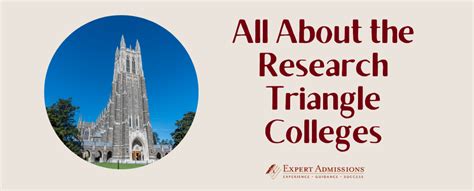The Research Triangle region of North Carolina has long been a hub of innovation and education, with three major research universities forming the core of its academic excellence. Duke University, North Carolina State University, and the University of North Carolina at Chapel Hill (UNC) collectively comprise the Research Triangle Universities (RTU) consortium, offering students world-class research opportunities, groundbreaking programs, and a vibrant collegiate experience.

Why Research Triangle Colleges Matter?
- Collaborative Research: The RTU consortium fosters interdisciplinary collaboration among its member universities, providing students with access to cutting-edge research facilities and renowned faculty.
- Economic Impact: Research Triangle colleges contribute over $20 billion annually to the regional economy, supporting local businesses and creating high-paying jobs.
- Innovation Hub: The region is home to a thriving startup ecosystem, with numerous technology companies benefiting from the proximity to university research and talent pool.
- Global Reach: The RTU consistently ranks among the top university systems worldwide, attracting students and faculty from diverse backgrounds.
- Quality Education: All three universities are consistently recognized for their academic excellence and research contributions, offering a wide range of undergraduate and graduate programs.
Benefits of Attending Research Triangle Colleges
- Access to World-Class Faculty: Engage with renowned researchers and educators at the forefront of their fields.
- Interdisciplinary Collaboration: Explore research and solve real-world problems through collaborations with faculty and students from different disciplines.
- State-of-the-Art Facilities: Utilize advanced research laboratories, libraries, and other academic resources to support your learning and research endeavors.
- Industry Partnerships: Gain practical experience and build connections with leading companies through internships, research partnerships, and networking events.
- Vibrant Campus Life: Enjoy a diverse student body, a wide range of extracurricular activities, and proximity to major metropolitan areas.
Duke University
- Founded in 1838, Duke University is a private research university renowned for its academic rigor and interdisciplinary approach.
- The university has 10 schools and colleges, offering undergraduate and graduate programs in a wide range of disciplines.
- Duke is home to over 16,000 students and 3,000 faculty members.
- Notable alumni include Apple co-founder Steve Jobs and former US Secretary of State Condoleezza Rice.
North Carolina State University
- Established in 1887, North Carolina State University (NCSU) is a public research university known for its engineering, agriculture, and STEM programs.
- The university has 10 colleges, offering undergraduate and graduate degrees in over 100 fields of study.
- NCSU has over 36,000 students and 3,000 faculty members.
- The university is a major contributor to the state’s economy, with an annual research budget of over $1 billion.
University of North Carolina at Chapel Hill
- Founded in 1789, UNC is a public research university that is considered one of the top universities in the United States.
- The university has 14 schools and colleges, offering undergraduate and graduate programs in a wide range of disciplines.
- UNC has over 30,000 students and 2,500 faculty members.
- The university is home to the Morehead-Cain Scholars Program, one of the most prestigious undergraduate scholarship programs in the country.
Comparison of Research Triangle Colleges
| Characteristic | Duke University | North Carolina State University | University of North Carolina at Chapel Hill |
|---|---|---|---|
| Type | Private | Public | Public |
| Enrollment | 16,000 | 36,000 | 30,000 |
| Faculty | 3,000 | 3,000 | 2,500 |
| Programs | Interdisciplinary | Engineering, Agriculture, STEM | Liberal Arts, Business, Medicine |
| Research Budget | $1.1 billion | $1 billion | $1.2 billion |
Pros and Cons of Attending Research Triangle Colleges
Pros
- World-class research opportunities: Collaborate with top researchers and access cutting-edge facilities.
- Interdisciplinary collaboration: Solve complex problems by working with students and faculty from different disciplines.
- Industry partnerships: Gain practical experience and build connections with leading companies.
- Vibrant campus life: Enjoy a diverse student body and participate in a wide range of extracurricular activities.
- Proximity to major metropolitan areas: Access cultural, entertainment, and job opportunities in nearby cities.
Cons
- High cost of living: The Research Triangle region has a relatively high cost of living compared to other parts of North Carolina.
- Competitive admissions: Admission to Research Triangle colleges is highly competitive, with low acceptance rates.
- Large class sizes: Some classes at Research Triangle colleges can be large, particularly in introductory courses.
- Parking challenges: Parking can be a challenge on all three university campuses.
- Distance from other major cities: The Research Triangle region is not as close to major cities as some other university towns.
FAQs about Research Triangle Colleges
- What is the RTU consortium?
The RTU consortium is a collaboration of Duke University, North Carolina State University, and the University of North Carolina at Chapel Hill that fosters interdisciplinary research and innovation. - How many students attend Research Triangle colleges?
Over 82,000 students attend Duke University, North Carolina State University, and the University of North Carolina at Chapel Hill combined. - What are the acceptance rates for Research Triangle colleges?
Acceptance rates vary by university, but they are generally below 30%. - What is the cost of tuition at Research Triangle colleges?
Tuition costs vary by university and program, but they typically range from $10,000 to $50,000 per year. - What is the average salary of graduates from Research Triangle colleges?
Graduates from Research Triangle colleges earn an average salary of $60,000 to $100,000 per year. - What is the Research Triangle region like?
The Research Triangle region is a vibrant and growing metropolitan area with a strong economy, excellent schools, and a diverse population. - What is the nightlife like in the Research Triangle region?
The Research Triangle region offers a variety of nightlife options, including bars, clubs, and live music venues. - What is the weather like in the Research Triangle region?
The Research Triangle region has a humid subtropical climate, with hot, humid summers and mild winters.
